Russian President Vladimir Putin, Chinese President Xi Jinping and other leaders of the BRICS emerging economies are gathering in South Africa for a summit likely to feature criticism of U.S. President Donald Trump's wave of tariffs on foreign goods.
The tariffs, and tit-for-tat taxes by U.S. trading partners, are fueling global worry over economic growth, particularly in developing nations that are heavily reliant on exports.
Click to Gallery
Russian President Vladimir Putin, Chinese President Xi Jinping and other leaders of the BRICS emerging economies are gathering in South Africa for a summit likely to feature criticism of U.S. President Donald Trump's wave of tariffs on foreign goods.
The trade disputes with Washington could also provide focus for the globe-spanning BRICS group that has lacked the clout of other multilateral institutions that guide global trade.
Despite their differences, the BRICS countries likely will find common ground in denunciations of "protectionism," the label affixed to U.S. policies that Trump says are designed to restore fairness for American companies.
BRICS countries should cooperate to counter a "certain superpower" that has "recklessly implemented unilateralism and protectionism" and undermined "economic globalization and the multilateral trading regime," Ambassador Lin Songtian wrote.
The Trump administration's trade measures have included tariffs on steel and aluminum. China is the main target but U.S. allies such as the European Union and Japan have also been subjected to them.
China's Xi held talks in South Africa with President Cyril Ramaphosa on Tuesday, ahead of the start of the three-day BRICS summit on Wednesday. The two countries signed investment agreements worth $14 billion, Ramaphosa said.
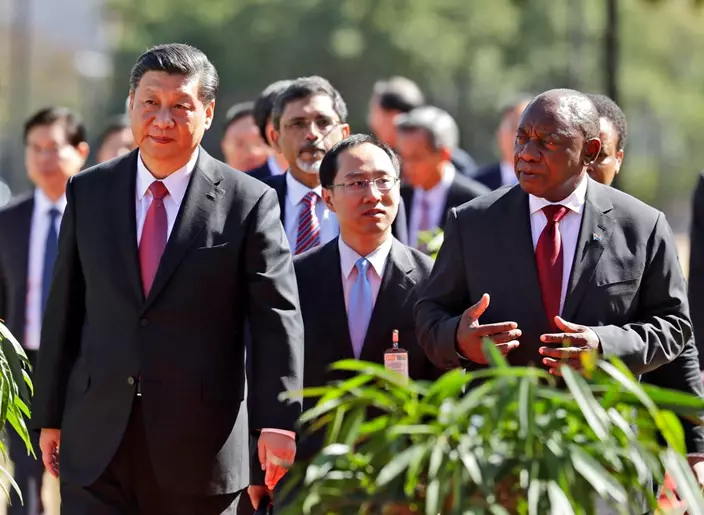
China's President Xi Jinping, left, walks with South African President Cyril Ramaphosa after a joint press conference at the government's Union Buildings in Pretoria, South Africa, Tuesday, July 24, 2018. Jinping is in the country to attend the three-day BRICS Summit starting Wednesday in Johannesburg. (AP Photo/Themba Hadebe)
The trade disputes with Washington could also provide focus for the globe-spanning BRICS group that has lacked the clout of other multilateral institutions that guide global trade.
Its members — Brazil, Russia, India, China and South Africa — are home to 3 billion people, or roughly 40 percent of the world's population, with political systems ranging from democratic to authoritarian. China and India, the two most populous countries, have a border dispute. South Africa has expressed concern about a trade imbalance with China, its biggest trading partner.
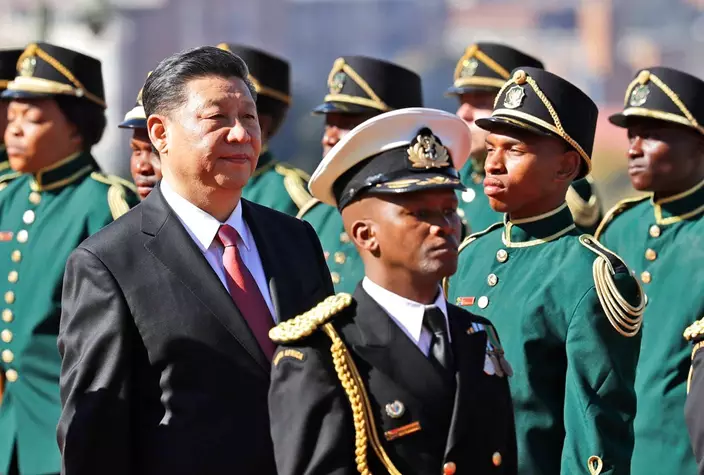
President Xi Jinping of China, left, inspect the honour guard during an official welcoming ceremony at the government's Union Buildings, in South Africa, Tuesday, July 24, 2018. Jinping is in the country to attend the three-day BRICS Summit starting Wednesday in Johannesburg. (AP Photo/Themba Hadebe)
Despite their differences, the BRICS countries likely will find common ground in denunciations of "protectionism," the label affixed to U.S. policies that Trump says are designed to restore fairness for American companies.
China's ambassador in South Africa set the tone in an opinion piece published in The Star, a South African newspaper.
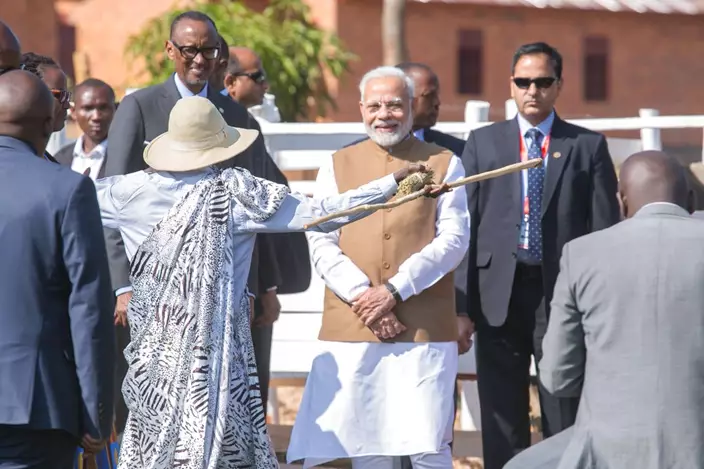
A local resident sings a cow poem for the Indian Prime Minister Narendra Modi, watched by Rwandan president, Paul Kagame, top left, during a visit to Rweru, Rwanda, Tuesday July 24, 2018. Modi gifted some cows to the residents of Mweru, to support President Paul Kagame's initiative to reduce poverty and childhood malnutrition. ( AP Photo)
BRICS countries should cooperate to counter a "certain superpower" that has "recklessly implemented unilateralism and protectionism" and undermined "economic globalization and the multilateral trading regime," Ambassador Lin Songtian wrote.
At a weekend meeting of the Group of 20 nations in Argentina on Sunday, U.S. Treasury Secretary Steven Mnuchin disputed that protectionism is the issue and said trade should be conducted on "fair and reciprocal terms." The G20 is composed of traditional economic powers such as the United States, Japan and Germany as well as nations such as China, Brazil, India and Argentina.
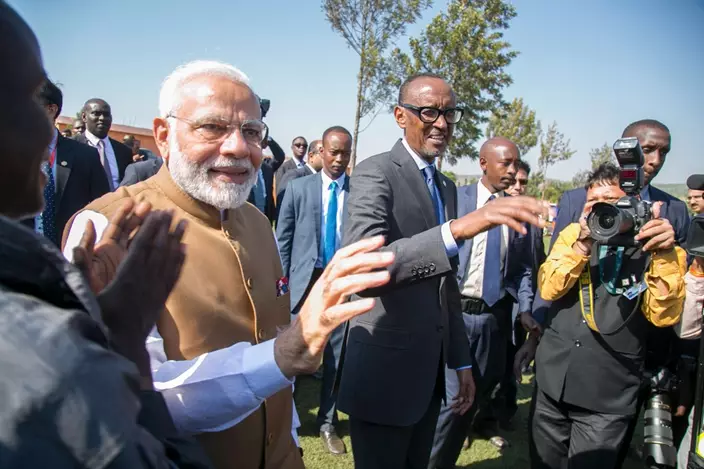
The Indian Prime Minister Narendra Modi, left, together with the President of Rwanda Paul Kagame, centre right, greet residents of Rweru, Rwanda, after Modi gave some cows for their good health, on Tuesday July 24, 2018. Modi gifted some cows to the residents of Mweru, to support President Paul Kagame's initiative to reduce poverty and childhood malnutrition. ( AP Photo)
The Trump administration's trade measures have included tariffs on steel and aluminum. China is the main target but U.S. allies such as the European Union and Japan have also been subjected to them.
The BRICS countries are concerned about "rising protectionism" and will work "to strengthen those areas where their interests align," said Cyril Prinsloo, a researcher at the South African Institute of International Affairs, a research center based in Johannesburg.
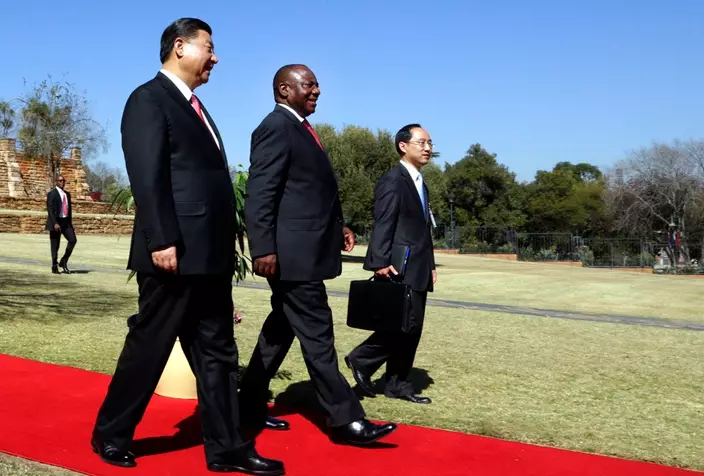
Chinese President Xi Jinping, left, walks with South African President Cyril Ramaphosa after their meeting for bilateral talks talks at the government's Union Buildings, Tuesday, July 24, 2018. Jinping is in the country to attend the three-day BRICS Summit starting Wednesday in Johannesburg. (AP Photo/Themba Hadebe)
China's Xi held talks in South Africa with President Cyril Ramaphosa on Tuesday, ahead of the start of the three-day BRICS summit on Wednesday. The two countries signed investment agreements worth $14 billion, Ramaphosa said.
The other BRICS leaders are Indian Prime Minister Narendra Modi and Brazilian President Michel Temer. Turkey's president, Recep Tayyip Erdogan, is also expected to attend.
The BRICS summit comes at a time of increasing "unilateralism" and provides an opportunity for member nations to push for a "larger collective role in global affairs," said Francois Gamet, head of Asia for the Standard Bank Group.
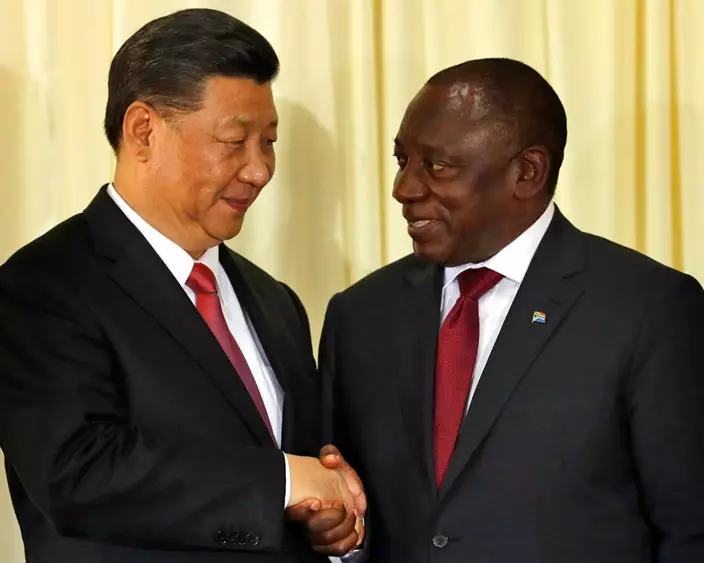
South African President Cyril Ramaphosa, right, shakes hand with Chinese President Xi Jinping after a joint press conference at the government's Union Buildings in Pretoria, South Africa, Tuesday, July 24, 2018. Jinping is in the country to attend the three-day BRICS Summit starting Wednesday in Johannesburg. (AP Photo/Themba Hadebe)
KYIV, Ukraine (AP) — A Ukrainian court on Friday ordered the detention of the country’s farm minister in the latest high-profile corruption investigation, while Kyiv security officials assessed how they can recover lost battlefield momentum in the war against Russia.
Ukraine’s High Anti-Corruption Court ruled that Agriculture Minister Oleksandr Solskyi should be held in custody for 60 days, but he was released after paying bail of 75 million hryvnias ($1.77 million), a statement said.
Ukraine’s National Anti-Corruption Bureau suspects Solskyi headed an organized crime group that between 2017 and 2021 unlawfully obtained land worth 291 million hryvnias ($6.85 million) and attempted to obtain other land worth 190 million hryvnias ($4.47 million).
Ukraine is trying to root out corruption that has long dogged the country. A dragnet over the past two years has seen Ukraine’s defense minister, top prosecutor, intelligence chief and other senior officials lose their jobs.
That has caused embarrassment and unease as Ukraine receives tens of billions of dollars in foreign aid to help fight Russia’s army, and the European Union and NATO have demanded widespread anti-graft measures before Kyiv can realize its ambition of joining the blocs.
In Ukraine's capital, doctors and ambulance crews evacuated patients from a children’s hospital on Friday after a video circulated online saying Russia planned to attack it.
Parents hefting bags of clothes, toys and food carried toddlers and led young children from the Kyiv City Children’s Hospital No. 1 on the outskirts of the city. Medics helped them into a fleet of waiting ambulances to be transported to other facilities.
In the video, a security official from Russian ally Belarus alleged that military personnel were based in the hospital. Kyiv city authorities said that the claim was “a lie and provocation.”
Kyiv Mayor Vitali Klitschko said that civic authorities were awaiting an assessment from security services before deciding when it was safe to reopen the hospital.
“We cannot risk the lives of our children,” he said.
Meanwhile, Ukrainian President Volodymyr Zelenskyy was due to hold online talks Friday with the Ukraine Defense Contact Group, which has been the key international organization coordinating the delivery of weapons and other aid to Ukraine.
Zelenskyy said late Thursday that the meeting would discuss how to turn around Ukraine’s fortunes on the battlefield. The Kremlin’s forces have gained an edge over Kyiv’s army in recent months as Ukraine grappled with a shortage of ammunition and troops.
Russia, despite sustaining high losses, has been taking control of small settlements as part of its effort to drive deeper into eastern Ukraine after capturing the city of Avdiivka in February, the U.K. defense ministry said Friday.
It’s been slow going for the Kremlin’s troops in eastern Ukraine and is likely to stay that way, according to the Institute for the Study of War. However, the key hilltop town of Chasiv Yar is vulnerable to the Russian onslaught, which is using glide bombs — powerful Soviet-era weapons that were originally unguided but have been retrofitted with a navigational targeting system — that obliterate targets.
“Russian forces do pose a credible threat of seizing Chasiv Yar, although they may not be able to do so rapidly,” the Washington-based think tank said late Thursday.
It added that Russian commanders are likely seeking to advance as much as possible before the arrival in the coming weeks and months of new U.S. military aid, which was held up for six months by political differences in Congress.
While that U.S. help wasn’t forthcoming, Ukraine’s European partners didn’t pick up the slack, according to German’s Kiel Institute for the World Economy, which tracks Ukraine support.
“The European aid in recent months is nowhere near enough to fill the gap left by the lack of U.S. assistance, particularly in the area of ammunition and artillery shells,” it said in a report Thursday.
Ukraine is making a broad effort to take back the initiative in the war after more than two years of fighting. It plans to manufacture more of its own weapons in the future, and is clamping down on young people avoiding conscription, though it will take time to process and train any new recruits.
Jill Lawless contributed to this report.
Follow AP’s coverage of the war in Ukraine at https://apnews.com/hub/russia-ukraine
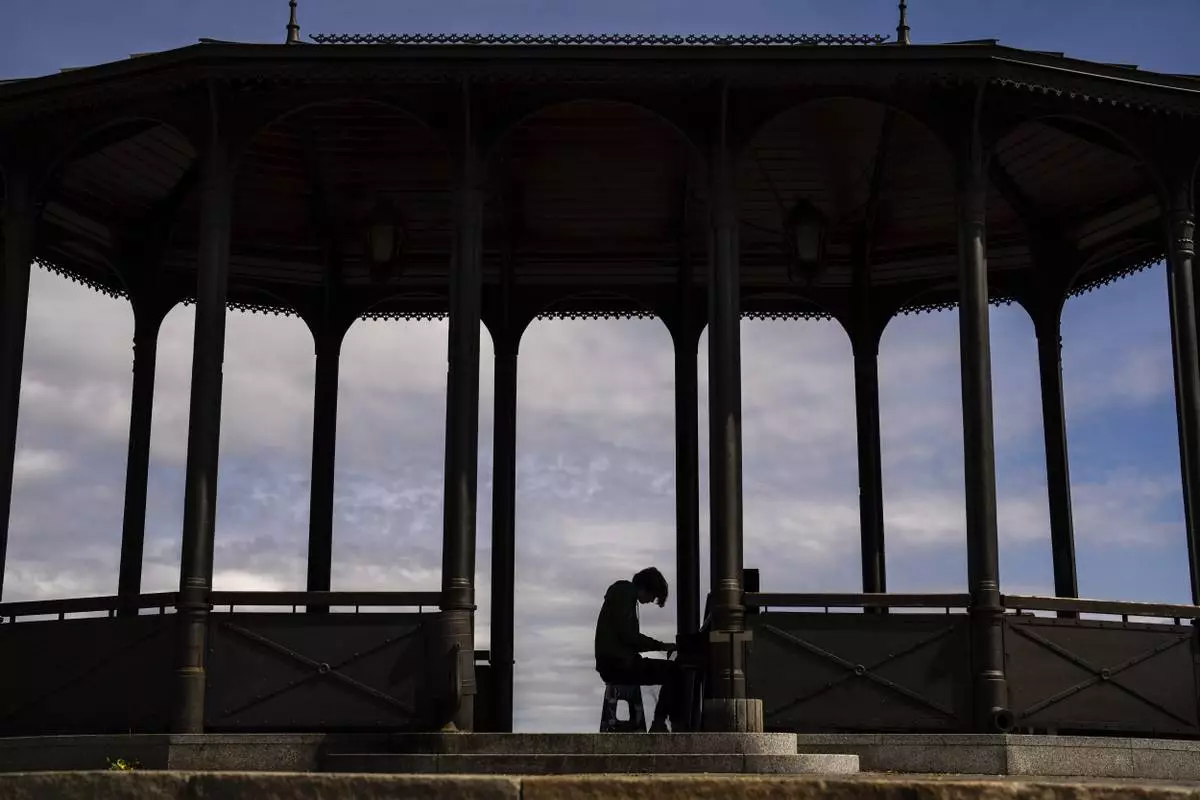
Ukrainian young acting student Gleb Batonskiy plays piano in a public park in Kyiv, Ukraine, Thursday, April 25, 2024. (AP Photo/Francisco Seco)
















